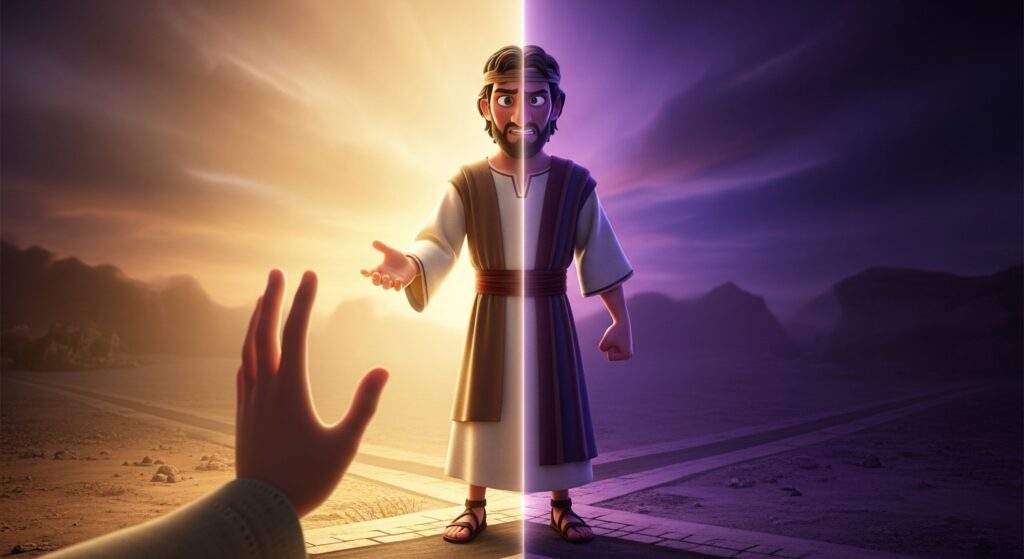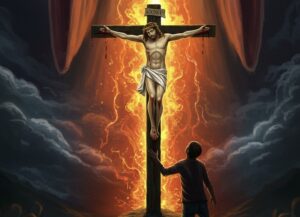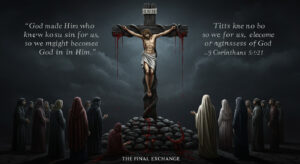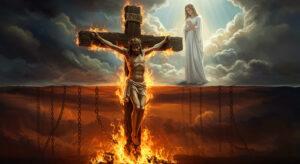**Part 1**, I’ll now expand it deeply — every truth will be explained clearly, like a teacher walking people through the Scripture slowly, exposing the reality of human weakness and showing why only Christ’s blood gives power, not the law.
Let’s begin.
—
## **Part 1: The Human Struggle to Do Good — The Cry for a Savior**
From the beginning of time, mankind has always wanted to do good. Inside every person, there is a voice whispering, *“Be kind. Be truthful. Be pure.”* It is the echo of God’s image still buried deep within us — for we were made in His likeness. But since the fall of Adam, that image became covered with dust, weakness, and sin. Humanity became like a broken mirror trying to reflect light — the light shines, but the reflection is distorted.
### **The Law Revealed the Standard, Not the Strength**
When God gave Israel the law through Moses (Romans 7:7–13), it wasn’t because the law could make them holy. The law was holy — but man was not. God gave the law to **reveal** what sin was, not to **remove** it. The law was like a mirror — it could show the dirt on your face, but it could not wash it away.
Think about it:
The law says, *“Do not lie.”*
But the law does not give you the **power not to lie**. It only tells you that lying is wrong.
So when temptation comes — maybe to protect yourself, or gain advantage, or escape shame — that law cannot stop the lie. It can only shout after you have lied, saying, “You are guilty!”
Paul explained this in Romans 7: the things he wanted to do, he could not do; and the things he hated, he ended up doing. Why? Because he found **another law** inside his flesh — the law of sin and death — stronger than his will.
The law of Moses was like a command written on stone. It told men what to do, but it didn’t enter their hearts to give them power. It was perfect, but man was not. That is why the Bible says the law was a **schoolmaster** (Galatians 3:24) — it was meant to **teach us our weakness**, not to make us righteous.
So, imagine a man standing before the law:
* The law says, *“Do not steal.”* But hunger makes him reach for what is not his.
* The law says, *“Do not covet.”* But jealousy rises when he sees another prosper.
* The law says, *“Do not lust.”* But desire burns in secret when no one is watching.
He knows what is right, yet he does wrong. His conscience agrees with the law, but his flesh betrays him. He tries, he fails. He weeps, then tries again. This is the story of all humanity — not just ancient Israel, but every soul born from Adam.
### **The Sinful Nature — The Root of All Failure**
When Adam sinned, something happened to the human race. His spirit — once filled with God’s breath — became darkened. What entered was not just guilt, but **corruption**. Sin became a nature, not merely an act.
So humans are not sinners *because they sin*; they sin *because they are sinners*. Sin lives inside the flesh like poison in blood. You may teach a snake not to bite, but when provoked, it will still strike — because that is its nature.
That’s why good people sometimes do evil things, and even the most disciplined person cannot escape secret pride, lust, anger, or fear. The nature of sin hides within, waiting for the right moment to express itself.
Even when people try to keep the law outwardly, inside there is another voice. For example:
* The law says, *“Do not murder.”*
But anger and hatred in the heart are already the seed of murder (Matthew 5:21–22).
* The law says, *“Do not commit adultery.”*
But looking with lust is already adultery in the heart (Matthew 5:27–28).
So, while a man may say, “I’ve never killed anyone,” Jesus shows that if he has hated his brother, he has already sinned in his heart. The law dealt with actions; Christ exposed the heart.
### **Why God Gave the Law Anyway**
Many ask, *“If God knew we couldn’t keep the law, why give it?”*
Because the law was never meant to make man righteous — it was meant to **lead man to grace**.
Without the law, man would not even know how lost he was. The law acted like light entering a dark room — not to condemn, but to reveal the dirt. And once man saw the dirt, he would realize his need for cleansing. That cleansing could only come by **blood**.
This is why the Old Testament was filled with sacrifices. Every time someone sinned, blood had to be shed — the blood of a lamb, goat, or bull. It was God’s way of teaching humanity that *life must be given for life* (Leviticus 17:11). Without the shedding of blood, there is no forgiveness of sins (Hebrews 9:22).
But even those sacrifices were not the real solution. They were shadows — pictures of what was coming. The blood of animals could only cover sin temporarily; it couldn’t remove it from the conscience. That’s why year after year, the priests kept offering sacrifices. It was like washing with water that could only clean the outside but not reach the heart.
### **The Story of the Woman and the Stones**
Then came Jesus — God in flesh, walking among sinners. One day, the teachers of the law brought a woman caught in adultery. According to the law of Moses, she must be stoned. They asked Jesus, *“What do you say?”*
Jesus bent down, wrote on the ground, and then said, *“He who is without sin, let him cast the first stone.”* (John 8:7)
No one moved. One by one, they dropped their stones and walked away. Why? Because His words exposed a truth they could not escape — *none of them was without sin*.
That scene shows the entire human race. We all hold stones — quick to judge others — until Jesus’ light exposes that we, too, are guilty. The law made everyone equal before God — no one righteous, not one (Romans 3:10).
When the woman lifted her eyes, only Jesus stood before her. The Law had condemned her; Love stood to save her. He said, *“Neither do I condemn you; go, and sin no more.”*
Notice something divine here:
Jesus did not say, “You have not sinned.” He said, “I do not condemn you.” That’s grace. The law reveals sin; Jesus removes condemnation.
### **The Two Debtors — Those Who Sin Much and Those Who Sin Little**
In Luke 7:36–50, Jesus tells the story of two debtors. One owed much, the other little. But when both debts were forgiven, Jesus asked, *“Which of them will love more?”* Simon said, *“The one who was forgiven much.”*
And Jesus agreed.
The point wasn’t that some people are “better sinners.” It was to show that all are debtors — and only those who realize the depth of their sin truly appreciate grace.
So when people look around and say, “The world is so evil; God should destroy it,” they forget — destruction would include *them too.* Because even our best deeds are tainted by self-interest and pride. The Pharisee who thought himself pure was as guilty as the woman he condemned.
If God wiped out all sinners, no one would be left. That’s why He chose another way — the way of **substitution**. He didn’t destroy us; He took our place.
### **The Law Exposes; Grace Recreates**
You see, the law could expose a sinner but couldn’t change his heart. Grace, however, goes deeper. It doesn’t just say, “Do not lie.” It creates in you a new nature that loves truth. It doesn’t just say, “Do not hate.” It pours love into your heart by the Holy Spirit (Romans 5:5).
So what the law demanded, grace supplied. The law said, “Be righteous.” Grace says, “You *are* righteous in Christ.” The law said, “Do not sin.” Grace says, “Sin shall not have dominion over you.”
In other words, what man could not do by willpower, God did by His Spirit through the blood of Jesus.
—






